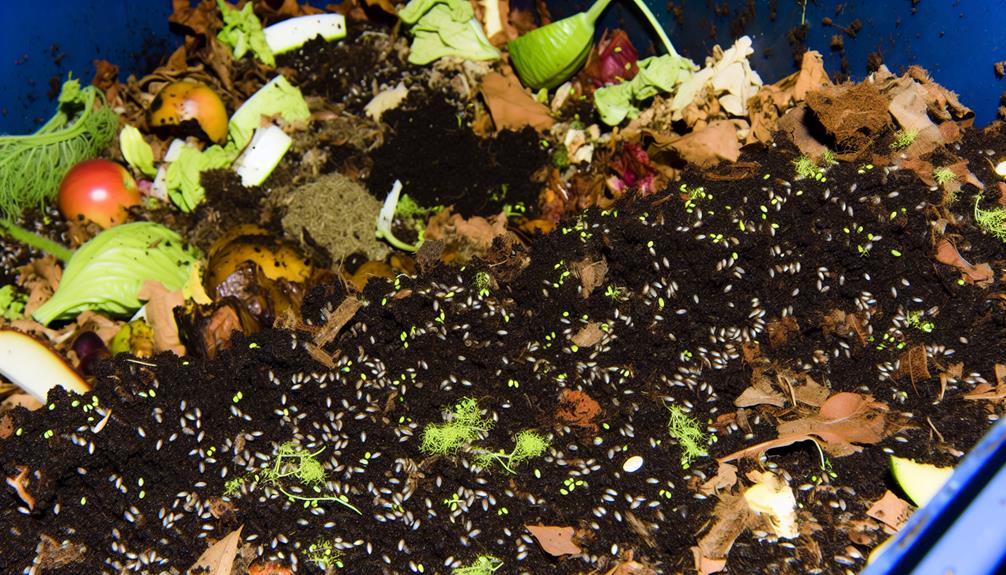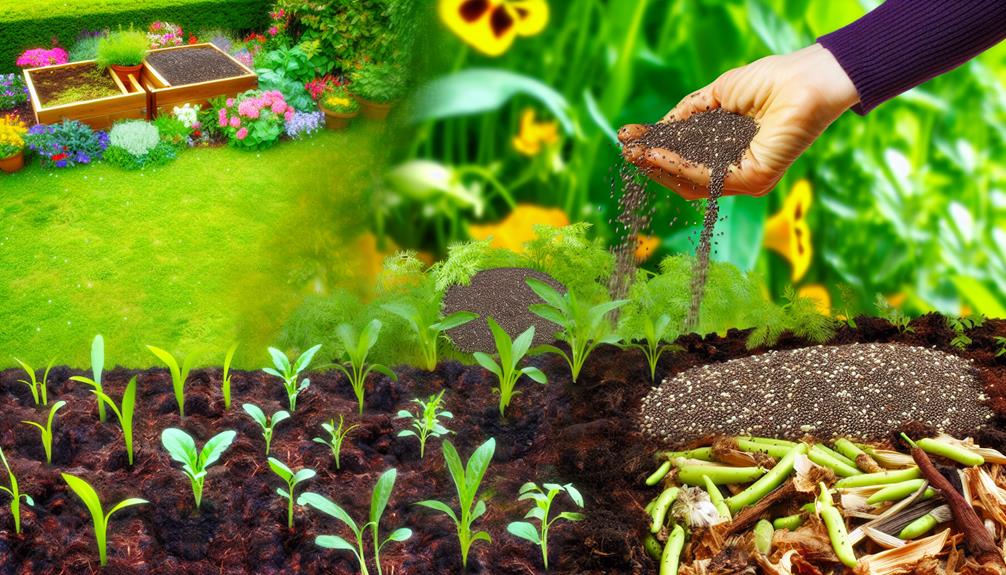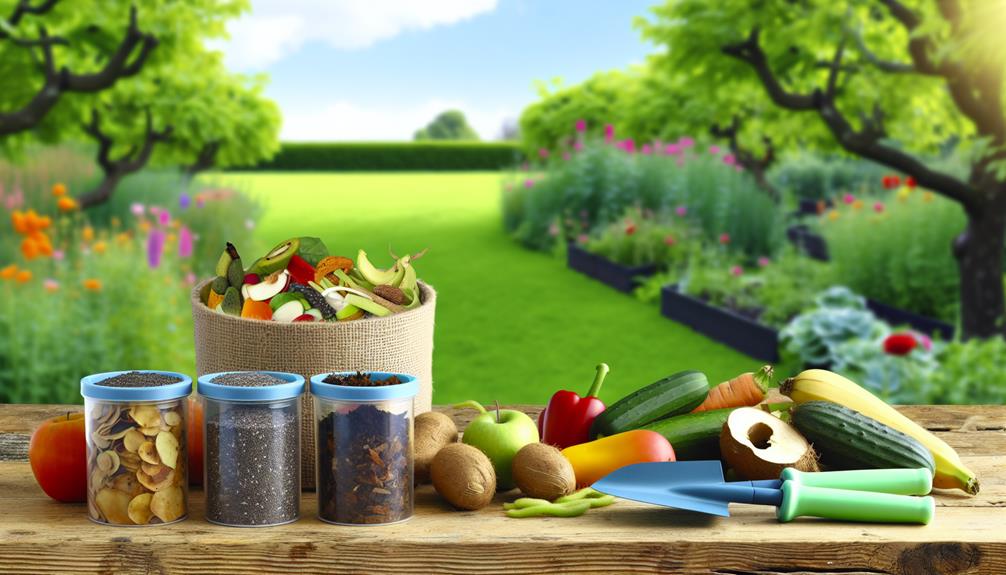

Yes, you can compost chia seeds, and they’ll add valuable nutrients to your compost pile. Chia seeds are rich in omega-3 fatty acids, protein, and essential minerals. To compost them effectively, grind the seeds first and mix them with other organic waste to maintain a balanced carbon-to-nitrogen ratio.
Be mindful of excess moisture, which can cause odor and mold, and turn your pile regularly for aeration. Pre-soaking the seeds can also speed up decomposition. Properly composted, chia seeds enhance soil moisture retention and plant health. There are even more benefits and tips to explore when you continue.
Packed with essential nutrients, chia seeds are a powerhouse of omega-3 fatty acids, fiber, protein, and various minerals. Their nutrient density makes them an excellent addition to both your diet and your compost bin.
Let’s break down what chia seeds are composed of:
Understanding the seed structure is key. Chia seeds have a unique outer shell that helps them absorb water quickly. This gel-forming property not only makes them useful in cooking but also influences how they decompose in compost.
Due to their small size and nutrient density, chia seeds break down efficiently, enriching your compost with valuable organic matter. When you compost chia seeds, you’re contributing to a healthier, more nutrient-rich compost pile.
Also Raed: Can You Compost Bread?
When you compost chia seeds, you enrich your compost with nutrient-rich organic matter that can greatly benefit your garden.

These seeds also help improve soil moisture retention, making your plants healthier and more resilient.
Composting chia seeds enriches your soil with essential nutrients that boost plant growth. By adding chia seeds to your compost, you create a nutrient-rich organic matter that greatly benefits your garden. The process encourages microbial activity, which breaks down organic material into valuable soil amendments.
Here are three key benefits:
In addition to enriching your soil with essential nutrients, adding chia seeds to your compost greatly improves soil moisture retention, ensuring your plants stay hydrated and healthy.
Chia seeds are known for their ability to absorb and retain large amounts of water. When you incorporate them into your compost, they enhance the soil structure, making it more porous and capable of holding moisture for longer periods. This is particularly advantageous during dry spells, as it reduces the frequency of watering needed and promotes more consistent soil moisture levels.
Water conservation is another significant benefit of composting chia seeds. By improving the soil’s capacity to retain water, you’re not only helping your plants thrive but also contributing to a more sustainable gardening practice. Less water runoff means more efficient use of resources, which is essential for both your garden and the environment.
To get started, simply mix chia seeds into your compost pile or bin, ensuring they’re evenly distributed. Over time, you’ll notice your soil becoming more resilient and better at supporting plant growth. This small addition can make a big difference in creating a thriving, sustainable garden that you can be proud of.
Also Raed: Can You Compost Bread Crumbs?
Why might you encounter issues when composting chia seeds?
One major challenge is managing the composting temperature. Chia seeds can retain moisture, potentially causing anaerobic conditions if the compost pile isn’t properly aerated. These conditions can slow down the decomposition process and lead to unpleasant odors.
Here are three specific challenges you might face:
Chia seeds are known for their ability to absorb water. While this can be beneficial for soil moisture retention, it can also create overly wet conditions in your compost pile. This excess moisture can hinder the composting process and promote the growth of mold and bacteria.
Chia seeds might sprout in your compost pile if they’re not adequately dried out before adding them. This can lead to unwanted plant growth, complicating your compost management.
Adding large quantities of chia seeds can disrupt the nutrient balance in your compost. Chia seeds are nutrient-dense, and an excess can lead to an imbalance, making it harder for microorganisms to break down other compost materials.
To start composting chia seeds effectively, you should first grind them to speed up the decomposition process.

Mixing these ground seeds with other organic waste guarantees balanced composting and nutrient distribution.
Typically, with proper conditions such as moisture and aeration, chia seeds will break down within a few months.
Properly preparing chia seeds before composting guarantees they break down efficiently and enrich your compost pile. To achieve this, focus on pre-soaking seeds and grinding seeds, both of which can speed up decomposition and nutrient release.
Here are three essential tips for preparing chia seeds for composting:
After preparing your chia seeds, understanding the best composting timeframe guarantees they contribute effectively to your compost pile. Chia seeds, like other organic materials, have a specific decomposition rate that determines how quickly they break down.
To optimize their organic breakdown, make sure your compost pile maintains a balanced carbon-to-nitrogen ratio. Aim for a mix of greens (rich in nitrogen) and browns (rich in carbon). Chia seeds fall into the green category, so balance them with materials like dried leaves or cardboard.
The overall decomposition rate for chia seeds can vary based on factors such as temperature, moisture, and aeration. In a well-maintained compost pile, you can expect chia seeds to decompose within a few months. Turn your compost pile regularly to introduce oxygen, which accelerates the breakdown process. Keep the pile moist, but not too wet—think of a wrung-out sponge.
Temperature is another essential factor. Compost piles with internal temperatures between 135°F and 160°F foster faster organic breakdown. Regularly monitor the temperature using a compost thermometer.
Also Raed: Can You Compost Basil?
Surprisingly, chia seeds can also serve as a natural remedy for soothing irritated skin. Simply mix chia seeds with water to create a gel-like substance and apply it to the affected area. This can help reduce inflammation and provide a cooling effect.
In addition to skincare, chia seeds offer several alternative uses that can benefit your home gardening and waste management efforts:
Yes, composting chia seeds can attract pests, but you can use pest deterrents to minimize compost pests. Adding citrus peels or covering with soil helps keep your compost community pest-free and thriving.
You’re curious about the decomposition rate of chia seeds in compost. Typically, they break down in a few months, integrating well with other organic matter. It’s all part of creating a thriving, sustainable compost community together!
For best results, focus on seed preparation and moisture control. Soak chia seeds beforehand and maintain a balanced moisture level in your compost. You’ll be part of a community that values effective and sustainable composting practices.
Yes, you can compost chia seeds in an indoor compost bin. Just be cautious of germination concerns and seed sprouting. Mixing them well into your compost can help prevent unwanted growth, keeping your compost community thriving.
Yes, chia seeds can affect the pH balance of compost, but their nutrient content boosts microbial activity. Don’t worry; they’re a great addition to your compost, helping create a rich, balanced environment for your community’s garden.
To successfully compost chia seeds, you should mix them with other organic materials like fruit and vegetable scraps, leaves, and grass clippings.
Make sure the compost pile is well-aerated and maintains proper moisture levels.
Be mindful of the seeds’ potential to sprout; regular turning of the pile can help mitigate this.
By following these best practices, you’ll effectively incorporate chia seeds into your compost, enriching your soil and promoting a healthier garden ecosystem.
